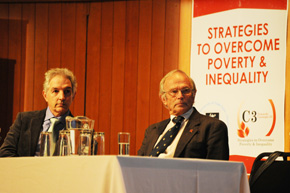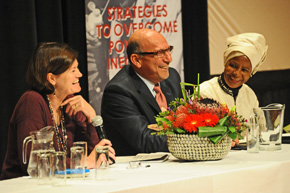Action, not numbers, focus of conference
04 September 2012 | Story by NewsroomThere would be no wallowing in statistics. That was the concerted promise at the start of Strategies to Overcome Poverty and Inequality: Towards Carnegie 3, on at UCT from 3 to 7 September.
 |
 |
| Deliberating: Speakers at the opening sessions of the conference featured (from left) Dr Max Price and Emer Prof Francis Wilson; and Kate O'Regan, Trevor Manuel and Dr Mamphela Ramphele. | |
Yes, vice-chancellor Dr Max Price set the scene and ran through some of those statistics - the depth of poverty has decreased; but inequality is up, more so within racial groups but also between racial groups; and government grants are bailing out many of the country's poorest. But for the rest of the opening night of the conference, anyway, the buzzwords were action and moving forward.
"In no time in the history of our country has there been so much evidence and discourse on the stubborn features of poverty and inequality and the devastating effects these have on the lives of millions of people in our country," said Associate Professor Viviene Taylor of the Department of Social Development and a member of the National Planning Committee (NPC), which, under Trevor Manuel, minister in the presidency for national planning, first asked for such a conference. "But what I want to emphasise in this opening session is that the national debate and discourse on poverty and inequality, as important as this is, has to go beyond the paralysis that seems to affect us at every level in our society, and has to begin to focus on practical strategies and ways of addressing poverty and inequality."
Rather, said conference impresario and pro vice-chancellor for poverty and inequality, Emeritus Professor Francis Wilson, the university will over the conference set out to - as he's long suggested it should, he quipped - provide "good coffee". Over which delegates must come together, get to know each other, talk and share ideas -"cross-pollinating like crazy".
Director of the prequel Second Carnegie Inquiry into Poverty and Development, conducted in the mid-1980s, Wilson pointed out that the current conference is remarkable in many ways. It was organised in about nine months, well below the time normally required for an event of such a scale. Over 350 papers - way more than organisers had hoped for - had been received since the call for papers went out in May. The conference would bring together academics, research institutions, government, non-government organisations and civil society in an environment of "interaction and dialogue", he reported.
But, cautioned Wilson, the conference is but a first step in a process that will take many years. "It's also a working conference," he noted, "and one in which we all have to ask tough questions about how we're going to make sure the things that matter really work, like our schools, like building the infrastructure we really need, like finding ways to eliminate huge corruption.
"These are the things we've got to tackle."
Others chipped in on the night. Conference co-ordinator Katharine Hall, senior researcher at UCT's Children's Institute in her day job, spoke of how the talks and sessions were weaved together to promote a "spirit of continuous sharing". Former UCT vice-chancellor Dr Mamphela Ramphele, who worked with Wilson on that Second Carnegie Inquiry and who now leads the Citizens Movement for Social Change, talked of the role of the citizenry and the need for a 'spiritual reconstruction" in the country. Kate O'Regan, former judge in the Constitutional Court, spoke of how the country's Constitution - hailed as everything from "transformative" to "deliberative" - may appear to operate in a different world from that of poverty but, in fact, urges the state and its citizens to uproot poverty and inequality. And Manuel spoke of some of the issues - leadership, sustainable livelihoods, enterprise - that would need to come up at the conference, and how the lessons, a handbook of sorts, that come out of Carnegie 3 can be applied elsewhere in the world.
His final words probably best served as a mantra for the conference: "Let's get to work."
 This work is licensed under a Creative Commons Attribution-NoDerivatives 4.0 International License.
This work is licensed under a Creative Commons Attribution-NoDerivatives 4.0 International License.
Please view the republishing articles page for more information.










